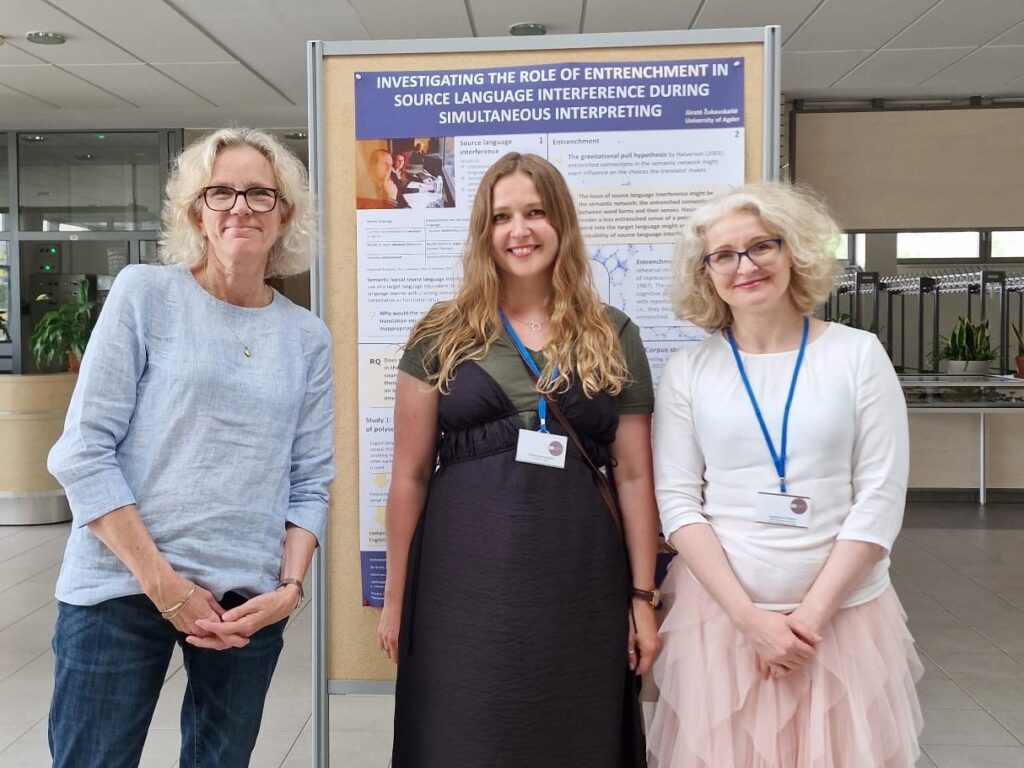The abstract submission for the 5th ICTIC conference to be held at the University of Agder in June 2025 has been extended from the 31st of August till the 15th of September.
More information here
The abstract submission for the 5th ICTIC conference to be held at the University of Agder in June 2025 has been extended from the 31st of August till the 15th of September.
More information here
After four successful and inspiring conferences in Argentina, Germany, Italy, and Chile, ICTIC 5 will be hosted by the University of Agder in Kristiansand, Norway. We are happy to welcome you from 2-4 June 2025 to Norway’s southern summer destination. The theme for the fifth iteration of the ICTIC conference is Translation and Cognition on the ground.
Studying cognition in translation and interpreting on the ground in this multitude of situations may include, but is not limited to topics such as translation and cognition in the context of:
Submissions to any of the topics above are invited, and participants may submit an abstract for either a full paper or a poster. ICTIC 5 extends a particular welcome to early-career researchers and new scholars to the field. ICTIC 5 is hosted by Agder Forum for Translation Studies and the University of Agder under the auspices of the TREC network.
Old abstract submission deadline: 31 August 2024
New Abstract submission: 15 September 2024
More information here.
Our leader, Sandra L. Halverson, has recently edited a new book together with Jun Pan and Jeremy Munday.
The book, entitled “Interlingual Readings of Political Discourse”, presents an overview of the expanding interdisciplinary domain encompassing translation, interpreting, and political discourse. It showcases recent research by scholars from various countries, offering insights into emerging trends and perspectives within this interdisciplinary realm.
Covering intersections and interactions among monolingual, bilingual, and multilingual translation and interpreting, the book aims at fostering a more comprehensive discussion of the interdisciplinary nature of translation and politics
Earlier in January, Jean Nitzke participated in the International Conference on “Creativity And Translation In The Age Of Artificial Intelligence” at the University of Innsbruck, Austria. The conference aimed to explore how the latest technological developments regarding generative AI and machine translation influence the theory, practice, and didactics of translation and interpreting with a focus on creative aspects.
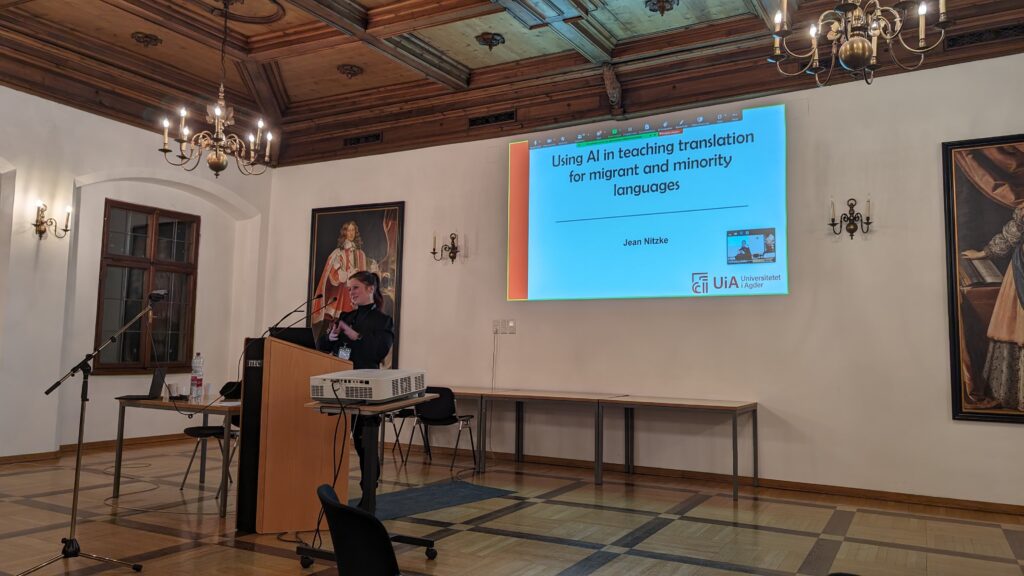
Jean’s presentation focused on generative AI and machine translation in teaching translation technologies for languages of low diffusion and minority languages. She explored not only how these technologies should be integrated into the courses, e.g. for post-editing, but also how they can enable the students to use their studying languages in such a course, even if the course instructor has no language proficiency.
From 2024, we will offer a one-year training programme in translation for public services (“Oversettelse i offentlig sektor”) consisting of six courses ranging from practical translation classes to classes on translation technologies and sight translation. The courses, which will be delivered online through a combination of synchronous and asynchronous sessions, consist of 30 Credits and aim to equip participants with basic translation skills in the context of Norway’s public services. In 2024, the programme will focus on the following language pairs: Norwegian—Arabic/Tigrinya/Ukrainian. The general units will be taught in English. Norwegian and Arabic, Tigrinya and Ukrainian (depending on the language pathway students are registered in) will be used to teach the practical translation units.
In connection with this new programme, Jean attended inDialog4 – a conference on public service interpreting and translation that gave her great insights into the recent developments of a very friendly and welcoming research field. Although the main focus of the conference was on public service interpreting, insights derived from the training of translators in the context of public services will be meaningful to this scholarly area.
The University of Agder hosts weekly seminars for the local community of Kristiansand, typically on Saturdays (Lørdagsuniversitet). One of our members, Chiara Astrid Gebbia, recently had the unique opportunity to share her research during one of these events.
On the 7th of October, Chiara delivered a speech centered around the question: “Can Metaphors Die?”. Metaphors play a ubiquitous role in our daily communication, often evading our conscious awareness. They reside within the folds of polysemy in our language and subtly influence our perception of professional roles, including that of translators.
In her presentation, Chiara breathed new life into these metaphors, shedding light on their significance and impact.
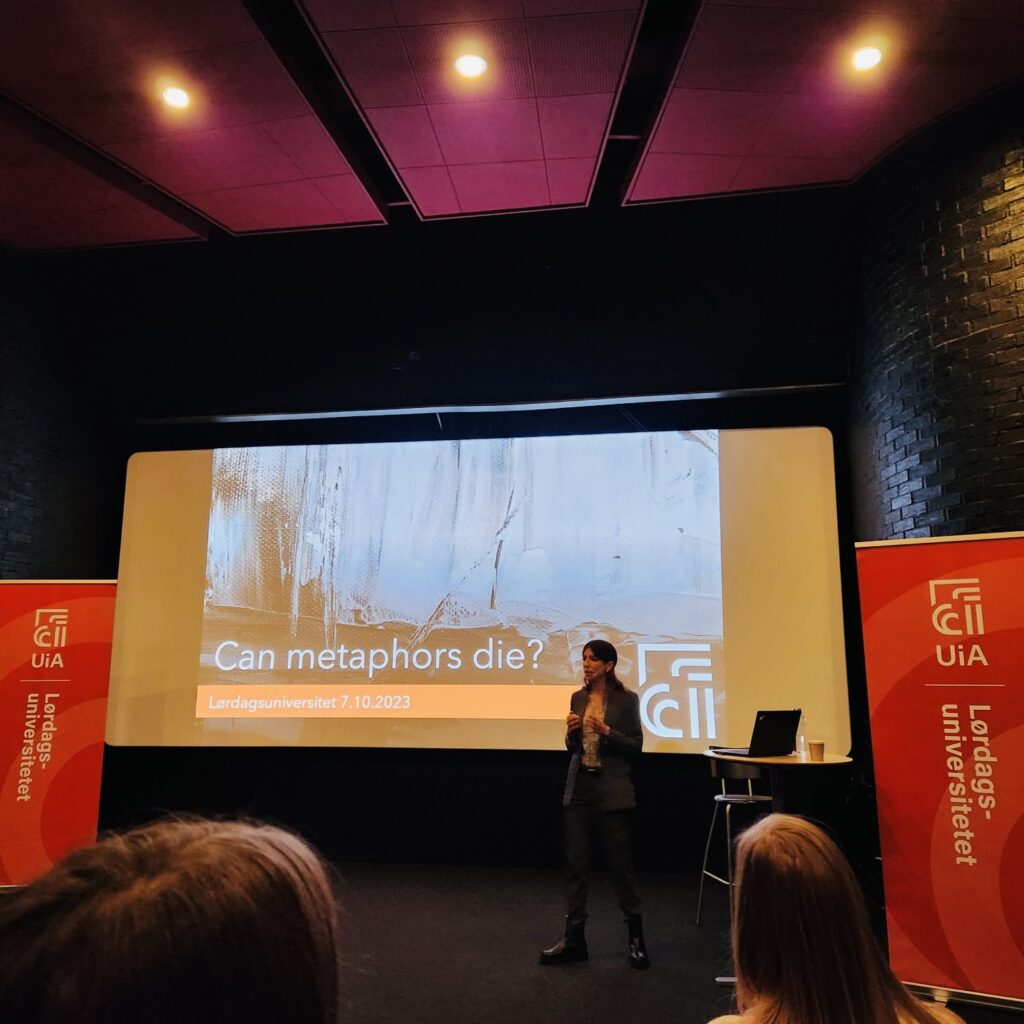
The National Science Week (Forskningsdagene) is an annual event in Norway where research institutions all over the country present some of their work to the public. Amongst other events, the University of Agder took to the streets (Forskningstorget) on September 23rd to disseminate its research with the vibrant local community of Kristiansand. Two members of our AFO group, Jean Nitzke and Chiara Astrid Gebbia, were given the responsibility of managing the exhibit that showcased the Department of Foreign Languages and Translation.
To welcome attendees of all age groups, we designed two engaging hands-on activities centered around the metaphors and idioms we commonly employ in our daily lives. Visitors were also encouraged to share their own metaphors that encapsulated their perspectives on translation and languages to enrich the event.
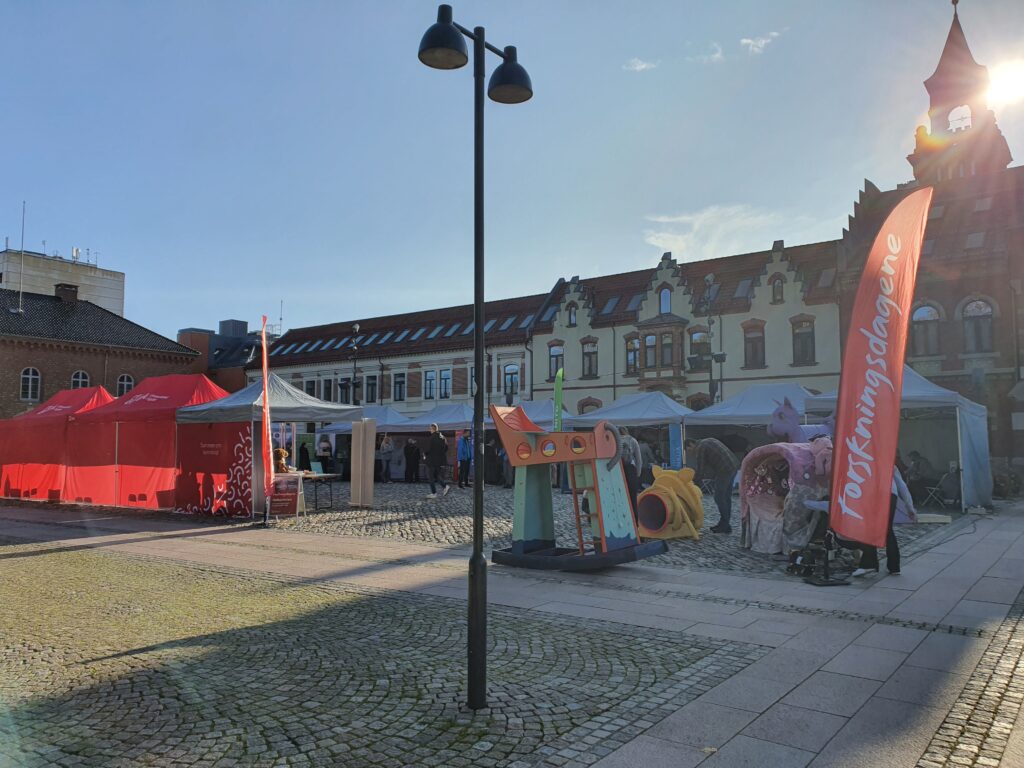
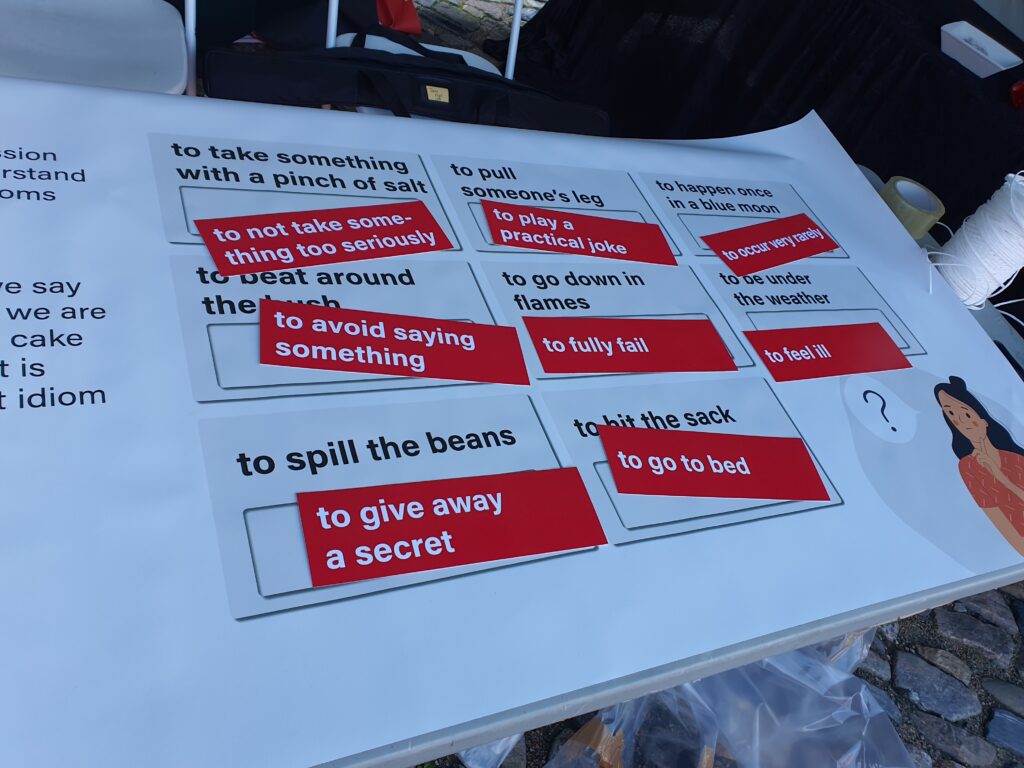
And finally, Sandra Halverson and Jean Nitzke got the chance to represent the translation-related study programs of UiA at the Interpreting Day (Tolkens dag) at OsloMet on September 25th. The afternoon not only offered a very interesting program, but also gave enough time for inspiring and meaningful conversation. Many thanks to the colleagues at OsloMet for giving us the opportunity!
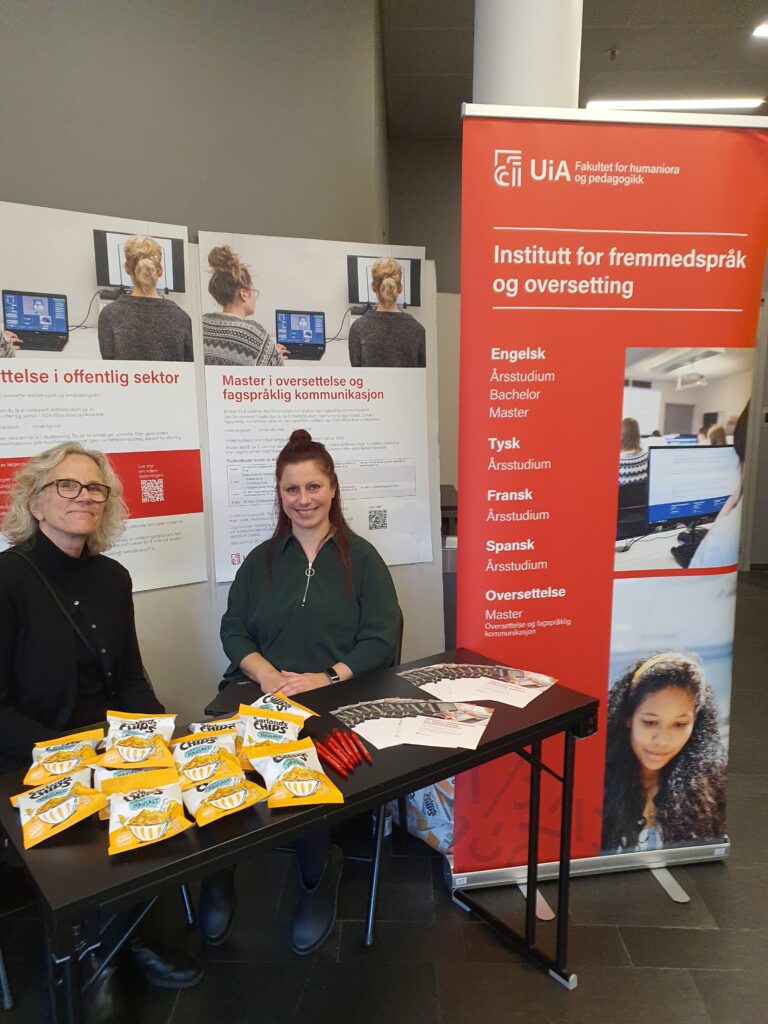
In early September, Jean Nitzke traveled to Santiago de Chile to present at the Fourth International Conference on Translation, Interpreting, and Cognition (ICTIC 4). ICTIC is a biannual conference where researchers on cognitive translation and interpreting studies from all over the world meet to exchange on their current research. Starting in Argentina in 2017, the conference has become an established event for the research community and tries to alternate between hosting universities in Southern America and Europe.
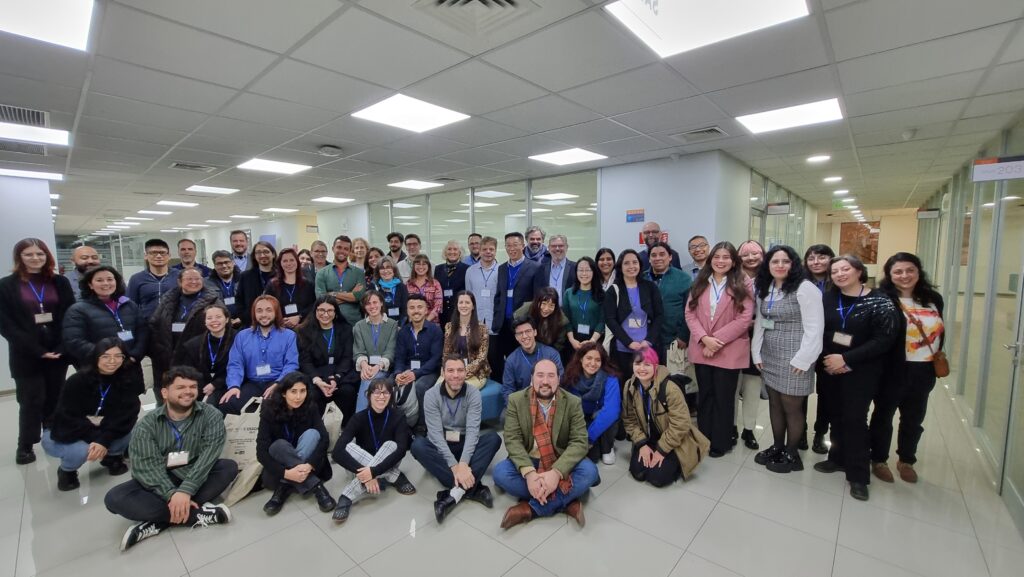
This year’s theme was “Methods we live by” and Jean presented on “Simulating realistic translation workflows in translator education: The challenges of hybrid teaching and multilingual courses”. She focused on the challenges and solutions on a course unit she and Sandra developed in the internally funded project simulating a translation office.
And we proudly announce that the next ICTIC in early June 2025 will be hosted by us! So, put a note in your calendar, save the date, and stay tuned.
On September 15, Sandra Halverson gave a talk for the start of the MA program in Janapese translation at the University of Bergen. The talk was titled “Translation and translation studies in Norway. Who, what, where?” and gave a brief overview of the landscape and development of the field of Translation Studies as a backdrop to describing the field’s current status in Norway.
In line with the theme of the symposium, she also discusses some characteristics of the practice of translation in Norway, contrasting the Norwegian case with the situation in many other European countries. The underlying theme of institutionalization provides a framework for the talk, which closes by discussing whether the anomaly identified in the talk matters, and if so, how.
The beginning of the Master’s program in Translation and Professional Communication was inaugurated on the 24th and 25th of August. The students were welcomed by Professor Sandra Louise Halverson and the Head of the Department of Foreign Languages and Translation, Tale Guldal.
Our research group is continuously active in developing the only dedicated MA in Translation in Norway. You can find out more about the program here.
Two members of our research group presented at the UCCTS 2023, which was held at the University of Poznań.
Sandra Halverson’s plenary talk (“Broadening the scope: the gravitational pull hypothesis in a usage-based theory of translation”) had the aim to merge the concept of the “gravitational pull hypothesis” with the one of “default translation” within the context of a usage-based theory of translation. The focal point of her exploration lay in understanding how specific linguistic attributes in the source language exert a profound influence on the target text choices, drawing parallels with the captivating pull of gravitational forces on objects.
Jūratė Žukauskaitė’s poster presentation, titled “Investigating the Role of Entrenchment in Source Language Interference during Simultaneous Interpreting”, discussed the influence of entrenched language patterns from the source language on the process of simultaneous interpreting.
Both presentations align with the theme of the conference, which focuses on the use of corpora in contrastive and translation studies.
